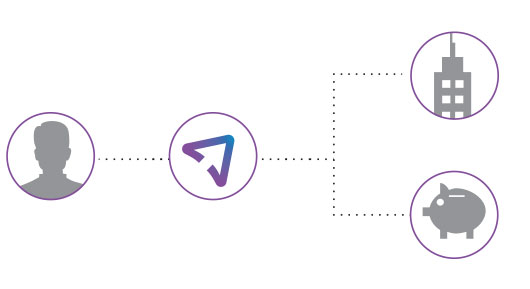Receiving Payments
1) Custom Designed for Insurance Industry:
- Closed system that can only process payments from brokerages to carriers
- Works with multiple systems and accounts
- Carrier settled – funds are pulled by Carrier
2) Customize and Mange Users:
- Designate and manage users
- Customize user settings to determine access levels and notifications
3) Real Time Notifications:
- You receive full notice of pending payments upon brokerage authorizing payment
- Policy data is directly associated with payment
4) Access and Manage Payment Reports:
- View real time reports that identify payment stages as pending, authorized or deposited
- Access associated policy data needed for reconciliation
- View historical deposits by brokerage (filter search criteria)
5) Automated Reconciliation Report:
- Choose file format to receive data
- Direct web services feed available for straight through processing
- ClearPay utilizes a level of system protection on par with many international banking institutions, including 256 bit encryption and data exchanged with standard security protocols
- Funds are transferred based on established and safe banking procedures
- Read more about ClearPay security
Sending Payments
1) Seamless Integration to BMS:
- Ability to integrate to all major BMS’, allowing for brokers to start + finish within the BMS.
- ClearPay runs silently in the background.
2) Easy Installation:
- Easy automated wizard driven installation and set-up
- No upfront costs
- Local installation of connectivity tool to provide data to generate electronic payment and transmission of relevant policy data.
3) Pay Electronically:
- Funds are transferred using existing banking protocols.
- Broker authorized – payment amount and deposit date are controlled by broker
4) Multiple Users with Customized Authority Levels:
- Choose differing levels of authority in the brokerage – ability to view only, generate payments, or approve payments.
- Remote approval.
- Designated authorities in brokerage can approve payments wherever you have an internet connection – phone, tablet or computer.
5) Automated reconciliation report:
- Data and funds are transmitted based upon brokerages entries into BMS.
- Carriers receive real-time reconciliation reports in their preferred format.
- Funds are transferred based on established and safe banking procedures.
- ClearPay utilizes a level of system protection on par with many international banking institutions, including 256 bit encryption and data exchanged with standard security protocols… Read more.


 ClearPay
ClearPay